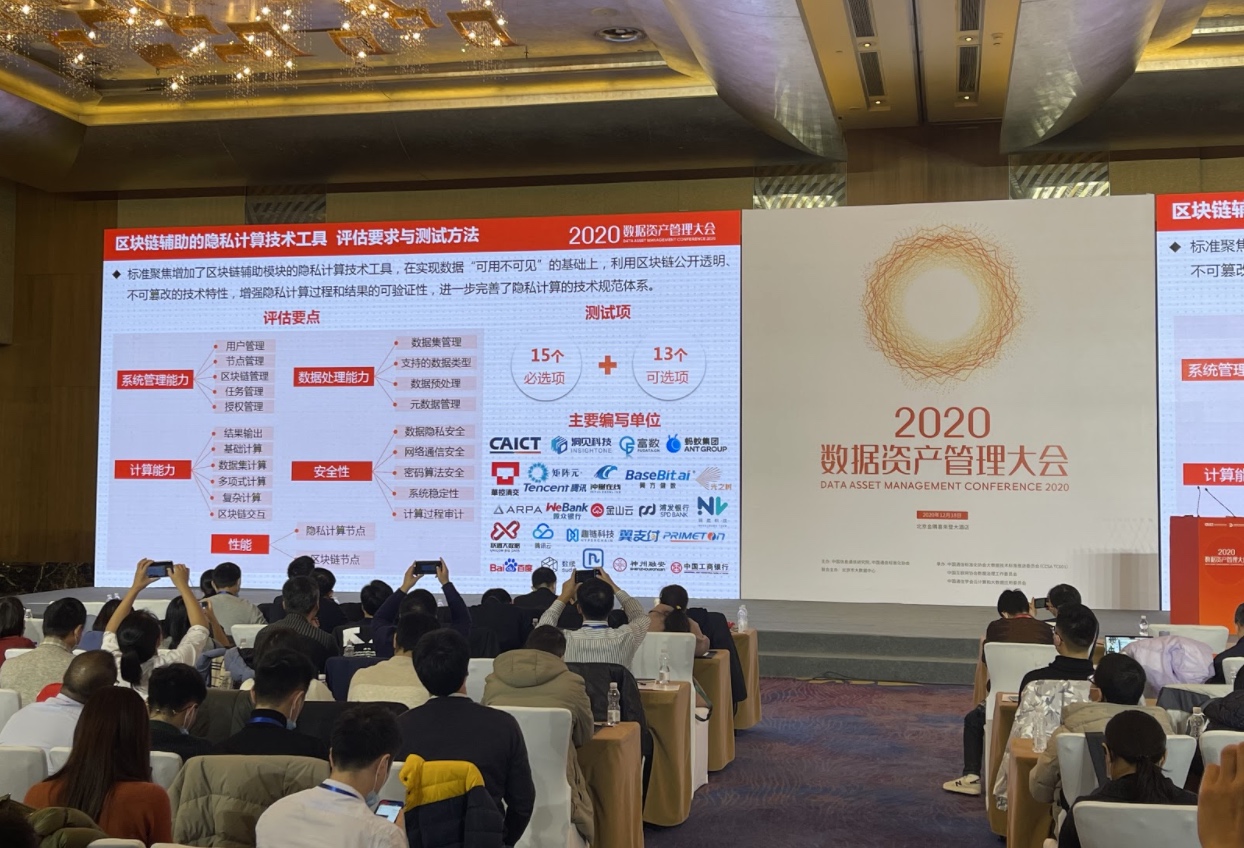On Dec 18th, 2020, the "Data Asset Management Conference 2020" jointly organized by the China Academy of Information and Communications Technology (CAICT), the China Communications Standards Association (CCSA), and the Internet Society of China was held in Beijing
SINGAPORE, SINGAPORE / ACCESSWIRE / March 10, 2021 / The "Blockchain-assisted Privacy-Preserving Computation Technical Tools, Technical Requirements and Test Methods" standard, proposed by the China Communications Standards Association and developed by organizations and enterprises such as CAICT, Ant Group, ARPA, Webank, Shanghai Pudong Development Bank, Unicom Big Data, Tencent Cloud Computing, and Baidu, was officially released at the conference.

The standard focuses on the combination of privacy-preserving computation technology and blockchain. It is the fourth standard related to privacy-preserving computation from the CCSA and the third standard of this kind that ARPA has participated in developing.
Privacy-Preserving Computation Combined With Blockchain
The rapid development of privacy-preserving computation in recent years is gratifying. However, we cannot ignore that, although it allows for the data to be available while remaining invisible in the process of multi-party computation, people do not know what key data and links are involved in the computation. This makes it difficult to verify the process or results and may limit its further development. To dispel people's doubts, we need to rely on blockchain as a trust machine.
Blockchain is inherently open, transparent, and impossible to tamper with, which grants it the ability to handle on-chain storage, backtracking, verification of key data and links in the computation process, and ensuring the verifiability of the computing process. Therefore, applying trusted blockchain technology to privacy-preserving computation processes can enhance the privacy, security, traceability, and verifiability of data in the end-to-end and full lifecycle process of these computation tasks.
This new standard focuses on solving the trust problem and further improves the technical specification system of privacy-preserving computation. The standard has standardized common terms, reference architecture, and technical requirements. It also provides reference test methods in system management capability, data processing capability, computing capability, security, and performance.
The combination of blockchain and privacy-preserving computation is of great concern to academia and industry. The synergistic development of blockchain and privacy-preserving computation was a significant trend in China's blockchain industry in CAICT's "Top Ten Trends in Blockchain Industry (2020)" report. ARPA will work with experts and improve blockchain and privacy-preserving computation going forward.
As a participant in the development of this standard, ARPA has participated in the development of several industry standards on privacy-preserving computation and shared learning with renowned enterprises and organizations such as Ant Group, Tencent Cloud, Baidu, Intel, Lenovo, China Academy of Information and Communications Technology, and Zhejiang University since 2019 to promote industry standardization in the field of privacy-preserving computation continuously.
There are currently four standards for privacy-preserving computation in China, and ARPA has participated in the development of three of them, including "Technical Requirements and Test Methods for Data Circulation Products based on privacy-preserving multi-party computation," "Technical Requirements and Test Methods for Data Computing Platforms Based on Trusted Execution Environments," and the recently released "Blockchain-assisted Privacy-Preserving Computation Technical Tools, Technical Requirements and Test Methods."
In 2019, ARPA was also invited to join the IEEE, the world's largest non-profit professional and technical society, and participate in developing the Standard for Technical Framework and Requirements of Shared Machine Learning (IEEE P2830).
Media Contact Information:
Yemu Xu
[email protected]
https://arpachain.io/
SOURCE: ARPA



